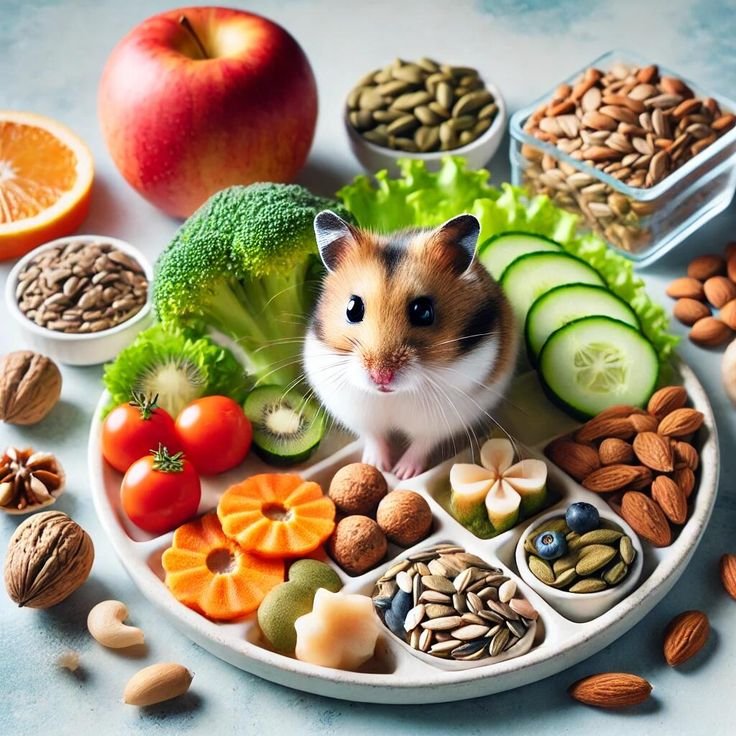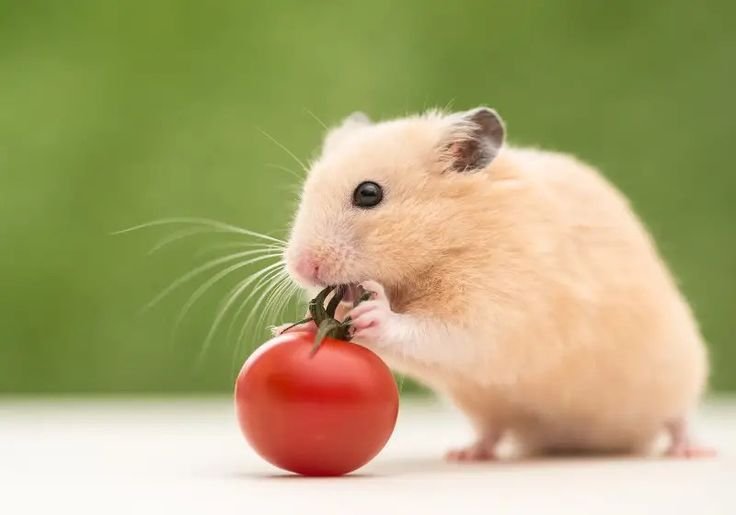Can Hamsters Eat Tomatoes
Tomatoes happen to be such a staple among human diets, but as you are a pet owner, that is a hamster, you may wonder if this is safe enough for your tiny friend. Can Hamsters Eat Tomatoes? Tomatoes possess a lot of vitamins and antioxidants. But unfortunately, they still contain some ingredients that could endanger small animals without proper preparation.
Understanding hamsters’ dietary requirements and tomatoes’ nourishing profile is fundamental before offering this succulent treat. In this aide, we’ll investigate whether tomatoes are a solid expansion to your hamster’s eating regimen or a tidbit improved left off the menu.
We’ll talk about the possible advantages, for example, the nutrients and hydration tomatoes can give. Plus we discuss the dangers including acidity and harmful parts like leaves and stems. Also, we’ll give useful hints on the best way to serve tomatoes securely, if by any stretch of the imagination, and in what amounts. By and by, you’ll have an unmistakable comprehension of how to keep your hamster blissful and healthy about tomatoes.
Can Hamsters Eat Tomatoes: Understanding Your Hamster’s Diet
Hamsters are cute, inquisitive animals with individual dietary requirements. Therefore, knowing what they can eat and what is not good for them is important. Whether hamsters are allowed to have tomatoes or not is a valid question. Tomatoes are full of vitamins, for example, vitamin C, as well as antioxidant properties. So they might look like a tasty treat for your little furry buddy. However, tomatoes also carry high acidity values. And parts such as leaves and stems that will be toxic for hamsters.
Feeding tomatoes to hamsters is not strictly prohibited, but should be done with care. Only ripe, red tomatoes should be given, and in extremely small amounts, as a treat rather than an item of diet. Unripe tomatoes or any part of the plant should never be given, as they can cause digestive problems or toxicity.
Understanding your hamster’s diet is all about balance. Fresh fruits and vegetables, such as small bits of carrots and cucumbers, are safer. Always be in your hamster’s best interests by researching and introducing new foods cautiously.

Hamster Diet
A hamster’s eating regimen is a significant part of their general well-being and satisfaction. These little, dynamic animals need a fair blend of supplements to flourish. A normal hamster diet comprises excellent business hamster pellets. It gives the fundamental nutrients and minerals required for their prosperity. Close by this, new leafy foods can be presented as infrequent treats; however, it’s urgent to pick safe choices like carrots, cucumbers, or apples (without seeds).
One more significant part of their eating regimen is protein. Limited quantities of bubbled eggs, mealworms, or plain cooked chicken can be given to hamsters. New water ought to always be available because hydration is basic to their well-being.
A few food varieties, notwithstanding, ought to be kept away from them. These include chocolate, citrus natural products, onions, and garlic that have poisonous properties for hamsters. Overindulgence in sweet or greasy treats can cause stoutness and medical conditions. An even, firmly checked diet gets your hamster lively, fun-loving, and good for quite a long time into the future.
Tomatoes for Hamsters: Are They Safe?
Tomatoes can be a scrumptious treat for hamsters since they are succulent and tasty. Be that as it may, it is crucial to know whether they are alright for your pet. Even though tomatoes contain great supplements, for example, nutrients A and C. There may be different dangers they might cause to the hamsters. The significant issue is that tomatoes are normally extremely acidic, meaning they can disturb your hamster’s stomach or cause stomach bother whenever eaten in large amounts.
Then again, the green pieces of the tomato plant, the leaves, and the stems, are noxious to hamsters and should not be given to them. The main safe limited quantities of tomatoes for hamsters are red tomatoes. While it is entirely OK to give them tomatoes as a treat at times, they ought to never make up their eating regimen.
For a more secure and better alternative, have a go at giving your hamster different natural products like apples, fewer seeds, or a cucumber. Continuously present new food varieties gradually and in modest quantities to keep a fair eating regimen.
Risks and Precautions: Can Hamsters Eat Tomatoes Without Harm?
Tomatoes are one of the fruits with relatively higher nutritional content. It will give a hamster vitamins such as vitamin C and some antioxidants. Nonetheless, there are various risks and precautions when introducing tomatoes to your pet. This is mainly concerning the acidity contained in tomatoes. Overconsumption leads to upsets, mostly stomach upset and diarrhea. A hamster is a very delicate creature about the stomach; thus, high acidity would be too problematic or could potentially lead to bigger health problems.
The green pieces of the tomato plant, like the leaves, stems, and unripe tomatoes, are poisonous to hamsters and ought never to be advertised. Just ready, red tomatoes are alright for utilization, and, surprisingly, then, they ought to be given in small, controlled sums.
As a precaution, introduce tomatoes gradually and observe your hamster for any adverse reaction. Other safe fruits and vegetables must always be incorporated into a balanced diet, while tomatoes are an occasional snack, not part of the regular diet, to avoid harming your hamster.
Can Hamsters Eat Citrus Fruits?
Hamsters love variety, yet not all things are protected to eat. With citrus fruits like oranges, lemons, limes, or grapefruits, care ought to be taken. However, the natural items are significantly nutritious, having a fair amount of L-ascorbic corrosive and other major nutrients. They are not to be dealt with by hamsters as they are acidic.
Citrus natural products can bother a hamster’s fragile stomach-related framework because of their causticity, causing distress, loose bowels, or other gastrointestinal issues. Besides, the sugar content in these natural products can cause weight or dental issues, assuming they are taken care of regularly. Subsequently, it is smarter to try not to take care of citrus fruits to your hamster.
All things being equal, you could give more secure natural products, like little bits of apple (without seeds), pear, or berries, which are not so much acidic but rather more appropriate to their dietary needs. Continuously give treats with some restraint and as a component of a fair diet to guarantee your hamster stays healthy and blissful.
FAQs
Can hamsters eat tomato seeds?
No, hamsters should avoid tomato seeds as they can cause digestive issues and may be difficult for them to digest.
How often can I feed my hamster tomatoes?
Tomatoes should be fed only as an occasional treat, about once a week, in small quantities to avoid any health risks.
Are cherry tomatoes safe for hamsters?
Yes, cherry tomatoes are safe in small amounts, but ensure they are ripe and free of stems and leaves.
What fruits can hamsters safely eat besides tomatoes?
Hamsters can safely eat fruits like apples (without seeds), pears, strawberries, and blueberries in moderation.
Conclusion
Tomatoes are here and there a decent treat for hamsters, yet they ought to be given with care. They have some healthy benefits, including nutrients and cell reinforcements; however, the plant’s leaves and stems contain a specific degree of corrosiveness and likely poisonousness, which can be harmful if not overseen as expected. Ensure tomatoes are ready, red, and just in limited quantities so as not to agitate your hamster’s stomach-related system.
To guarantee your hamster is healthy, you ought to have a reasonable eating regimen of good pellets, fresh vegetables, and safe fruits. Tomatoes resemble numerous different treats: never a substitute for their primary diet, however, they can be given as an intermittent treat. By knowing the dangers and having rules on the most proficient method to take care of them securely, you can give a decent blend of food varieties that will, by and large, improve your hamster’s health and happiness.





